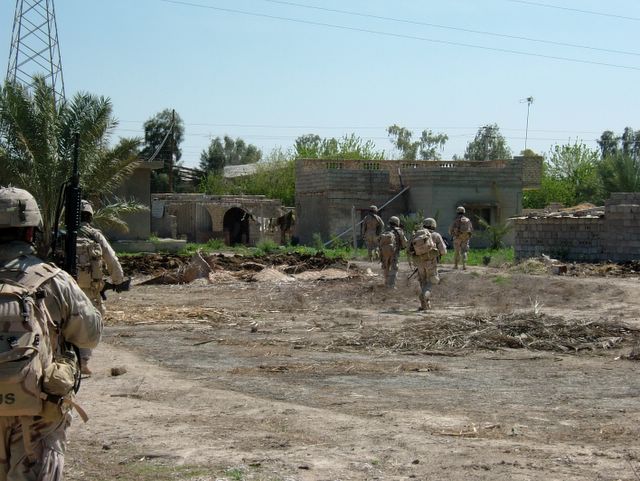Democrats Refocus Message on Iraq After Military Gains
By Jonathan Weisman and Anne E. Kornblut
Washington Post Staff Writers
Wednesday, August 22, 2007; A04
Democratic leaders in Congress had planned to use August recess to raise the heat on Republicans to break with President Bush on the Iraq war. Instead, Democrats have been forced to recalibrate their own message in the face of recent positive signs on the security front, increasingly focusing their criticisms on what those military gains have not achieved: reconciliation among Iraq's diverse political factions.
And now the Democrats, along with wavering Republicans, will face an advertising blitz from Bush supporters determined to remain on offense. A new pressure group, Freedom's Watch, will unveil a month-long, $15 million television, radio and grass-roots campaign today designed to shore up support for Bush's policies before the commander of U.S. forces in Iraq, Army Gen. David H. Petraeus, lays out a White House assessment of the war's progress. The first installment of Petraeus's testimony is scheduled to be delivered before the House Armed Services and Foreign Affairs committees on the sixth anniversary of the Sept. 11, 2001, terrorist attacks, a fact both the administration and congressional Democrats say is simply a scheduling coincidence.
The leading Democratic candidates for the White House have fallen into line with the campaign to praise military progress while excoriating Iraqi leaders for their unwillingness to reach political accommodations that could end the sectarian warfare.
"We've begun to change tactics in Iraq, and in some areas, particularly in Anbar province, it's working," Sen. Hillary Rodham Clinton (D-N.Y.) said in a speech to the Veterans of Foreign Wars on Monday.
"My assessment is that if we put an additional 30,000 of our troops into Baghdad, that's going to quell some of the violence in the short term," Sen. Barack Obama (D-Ill.) echoed in a conference call with reporters Tuesday. "I don't think there's any doubt that as long as U.S. troops are present that they are going to be doing outstanding work."
Advisers to both said theirs were political as well as substantive statements, part of a broader Democratic effort to frame Petraeus's report before it is released next month by preemptively acknowledging some military success in the region. Aides to several Senate Democrats said they expect that to be a recurring theme in the coming weeks, as lawmakers return to hear Petraeus's testimony and to possibly take up a defense authorization bill and related amendments on the war.
For Democratic congressional leaders, the dog days of August are looking anything but quiet. Having failed twice to crack GOP opposition and force a major change in war policy, Democrats risk further alienating their restive supporters if the September showdown again ends in stalemate. House Democratic leaders held an early morning conference call yesterday with House Armed Services Committee Chairman Ike Skelton (D-Mo.), honing a new message: Of course an influx of U.S. troops has improved security in Iraq, but without any progress on political reconciliation, the sweat and blood of American forces has been for naught.
House Democratic Caucus Chairman Rahm Emanuel (D-Ill.) made a round of calls yesterday to freshman Democrats, some of whom recently returned from trips to Iraq and made news with their positive comments on military progress. "I'm not finding any wobbliness on the war -- at all," Emanuel said.
The burst of effort has been striking, if only because Democrats left for their August recess confident that Republicans would be on the defensive by now. Instead, the GOP has gone on the attack. The new privately funded ad campaign, to run in 20 states, features a gut-level appeal from Iraq war veterans and the families of fallen soldiers, pleading: "It's no time to quit. It's no time for politics."
"For people who believe in peace through strength, the cavalry is coming," said Ari Fleischer, a former Bush White House press secretary who is helping to head Freedom's Watch.
GOP leaders have latched on to positive comments from Democrats -- often out of context -- to portray the congressional majority as splintering. Rep. Ellen O. Tauscher (D-Calif.), an Armed Services Committee member who is close to House Speaker Nancy Pelosi (D-Calif.), said many of her colleagues learned a hard lesson from the Republican campaign.
"I don't know of anybody who isn't desperately supportive of the military," she said. "People want to say positive things. But it's difficult to say positive things in this environment and not have some snarky apologist for the White House turn it into some clipped phraseology that looks like support for the president's policies."
Rep. Jerry McNerney (D-Calif.), who made waves when he returned from Iraq by saying he was willing to be more flexible on troop withdrawal timelines, issued a statement to constituents "setting the record straight."
"I am firmly in favor of withdrawing troops on a timeline that includes both a definite start date and a definite end date," he wrote on his Web site.
But in an interview yesterday, McNerney made clear his views have shifted since returning from Iraq. He said Democrats should be willing to negotiate with the generals in Iraq over just how much more time they might need. And, he said, Democrats should move beyond their confrontational approach, away from tough-minded, partisan withdrawal resolutions, to be more conciliatory with Republicans who might also be looking for a way out of the war.
"We should sit down with Republicans, see what would be acceptable to them to end the war and present it to the president, start negotiating from the beginning," he said, adding, "I don't know what the [Democratic] leadership is thinking. Sometimes they've done things that are beyond me."
In the fight for the Democratic presidential nomination, former senator John Edwards issued a scathing attack on Clinton's remark. But he said there has been "progress in Al-Anbar province."
"Senator Clinton's view that the President's Iraq policy is 'working' is another instance of a Washington politician trying to have it both ways," Edwards campaign manager David Bonior said in a statement. "You cannot be for the President's strategy in Iraq but against the war. The American people deserve straight talk and real answers on Iraq, not double-speak, triangulation, or political positioning."












